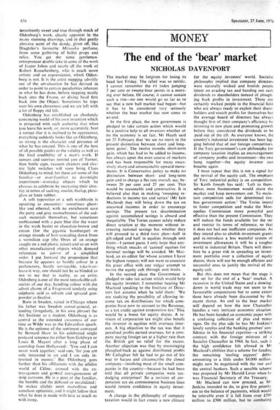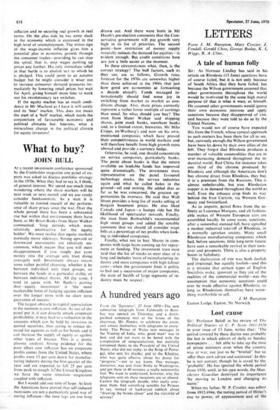MONEY The end of the 'bear' market
NICHOLAS DAVENPORT
The market may be forgiven for losing its head last Friday. The relief was so terrific. I cannot remember the FT index jumping 7 per cent or twenty-four points in a morn- ing ever before. Of course, it cannot sustain such a rise—no one would go so far as to say that a new bull market had begun—but it has to be considered very seriously whether the bear market has now come to an end.
In the first place, the new government is pledged to take certain action which would be a positive help to all investors whether or no the economy is set fair, Mr Heath said on 25 February that 'we see no merit in the present distinction between short and long- term gains'. The twelve months short-term gain, which has had to be added to income, has always upset the even course of markets and has been responsible for many exces- sively sharp and unsustainable upward move- ments. It is Conservative policy to make no distinction between short- and long-term gain and to charge a flat rate overall, say, be- tween 20 per cent and 25 per cent. This would be reasonable and constructive. It is believed also that in making 'sweeping re- ductions in income tax and surtax' (Mr lain Macleod) they will bring down the tax on unearned incomes in order to encourage savings. The present tax discrimination against accumulated savings is absurd and inequitable. The Tories cannot safely reduce direct taxation at the moment without in- creasing national savings but whether they will proceed to a third SAYE plan—half in gilt-edged and half in equities through unit trusts—I cannot guess. I only hope that any- thing which smacks of 'canned' equities for national savings will be avoided. Mr Mac- leod, an ex-editor for whose acumen I have the highest respect; will not want to associate his great office with any vulgar attempt to revive the equity cult through unit trusts.
In the second place the Government is pledged to take tax action which would help the equity investor, I remember hearing Mr Macleod speaking to the Institute of Direc- tors last autumn. when he told them: 'We are studying the possibility of allowing in- come tax. on distributions for which com- panies have now to account to the Revenue, as a tax credit against corporation tax.' This would be a boost for equity shares. A re- vision of corporation tax might also benefit the investor in equities with overseas inter- ests. A big objection to the tax was that it penalised profits earned overseas, for a com- pany paying foreign tax at a higher rate than the British got no relief for the excess.
Another objection was that by encouraging ploughed-back as against distributed profits Mr Callaghan felt he had to go out of his way to harass and circumscribe the closed company—involving most of the small com- panies in the country—because he had been told that all private companies were tax- dodging enterprises! So a revision of cor- poration tax on commonsense business lines would restore confidence in equity invest- ment.
A change in the philosophy of company taxation would in fact create a new climate
for the equity investors' world. Socialist philosophy implied that company directors were naturally wicked and brutish people intent on evading tax and handing out cash dividends to shareholders instead of plough- ing back profits in investment. There are certainly wicked people in the financial field who are always ready to exploit their share- holders and snatch profits for themselves but the average board of directors has always thought first of their company's efficiency by iniesting in new plant and promoting growth before they considered the dividends to be paid out of the till. As everyone knows, the country's industrial investment has been lag- ging behind that of our foreign competitors. If the Tory government's Lew philosophy for company taxation implies an encouragement of company profits and investment—the two hang together—the equity investor can breathe again.
I must repeat that this is not a signal for the revival of the equity cult. The emphasis of Tory industrial policy is on competition. Sir Keith Joseph has said: 'Left to them- selves most businessmen would share the market and keep newcomers out. To main- tain competition calls for d,etemiined tire- less government action.' The Tories intend to foster competition and make the Mon- opolies Commission more powerful and effective than the present Commission. They will reduce the funds available for the IRC and restrict its terms of reference, so that it does not bail out inefficient companies. As they intend also to abolish investment grants and re-introduce a less wasteful system of investment allowances it will be a tougher world in industrial Britain. There will there- fore be a great risk in spreading an invest- ment portfolio over a collection of equity shares; there will not be enough efficient and successful ones to justify the revival of the equity cult.
But this does not mean that the stage is not set for the end of a 'bear' market. A recession in the United States and a slowing- down in world trade may not seem to be favourable conjunctures but to some extent these have already been discounted by the recent slump. An end to the bear market will depend on how the new Chancellor handles a very intricate economic situation. He has been handed an economic paper with a confusing collection of plus and minus signs. On the plus side he has Mr Jenkins's lovely surplus and the banking gnomes' con- fidence in his financial expertise—a striking contrast with the foreign mistrust of a Socialist Chancellor in 1964. In fact, such is the high confidence felt abroad in Mr Macleod's abilities that a scheme for funding the remaining 'sterling support' . debts.
amounting to a little under $4,000 million. might now be negotiated with the IMF and the central bankers. Such a sensible scheme was proposed by Mr Harold Lever when he was Financial Secretary of the Treasury.
Mr Macleod can now proceed, as Mr Jenkins intended to do, to give first priority
not to the balance of payments, which would be tolerable even if it fell from over £500 million to £300 million, but to combating inflation and to securing real growth in real terms. On the plus side he has some slack in the economy which is expressed in the high level of unemployment. The minus sign of the wage-income inflation gives him a potential plus in economic growth through the consumer trades—providing he can stop the spiral, that is, stop wages pushing up prices any further. His only immediate relief in that battle is to abolish SET to which he is pledged. This could point to an autumn budget but he might consider it wiser not to increase consumer demand pressures im- mediately by lowering retail prices but wait for April, giving himself more time to work out his revolutionary tax switches.
If the equity market has as much confi- dence in Mr Macleod as I have it will surely end its 'bear' market. This does not mean the start of a 'bull' market, which needs the conjuncture of favourable economic and political climates but, heavens, what a miraculous change in the political climate for equity investors!































 Previous page
Previous page